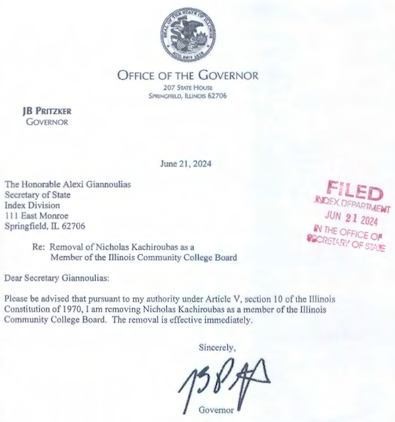* November of 2021…
The Itasca Village Board turned down a proposed drug rehab center after two years of debate among residents.
The Haymarket Center wanted to turn a former Holiday Inn, located at 860 West Irving Park Road, into a 240-bed drug treatment center.
Since 2019, there has been opposition by some Itasca residents since the proposal, who argue the village is too small for the facility. They have voiced concerns related to zoning changes, tax revenues and whether emergency services would be able to handle possible increased demand. […]
While the proposed facility cleared zoning and planning, the village’s board had the final say with a 6-0 vote Tuesday night not to go ahead with construction.
* December of 2021…
The Haymarket drug treatment center’s more-than-two-year attempt to open a rehab in Itasca took another turn Thursday when officials said U.S. Attorney John Lausch has launched an investigation into whether the village’s rejection of the center was in keeping with the Americans with Disabilities Act.
Mayor Jeff Pruyn released a letter Lausch sent last week, in which he announced the probe and noted that the ADA protects people with disabilities — including substance use disorder — from discrimination.
The Lausch letter is here.
* January of 2022…
The Haymarket drug treatment center filed a federal lawsuit Tuesday against the village of Itasca, claiming its rejection of a rehab facility proposed for a former hotel amounted to discrimination against people with substance-use disorder. […]
“The intentional and orchestrated discriminatory conduct across Itasca’s key governmental entities is designed to interfere with the rights of Haymarket Center, the people with disabilities it serves, and their families,” attorney Mary Rosenberg of Access Living, an advocacy center for the disabled that is representing Haymarket in the lawsuit, said in a statement announcing the lawsuit.
* Today…
The U.S. Attorney’s Office in Chicago has sought to file a complaint in intervention in a pending lawsuit against Itasca, Ill., alleging the village engaged in unlawful disability discrimination in reviewing and ultimately denying a zoning request filed by a non-profit health care provider to use its property as a treatment center for people with substance-use disorders.
* From the complaint in intervention…
The Department of Justice has since completed an extensive investigation and substantiated Haymarket’s claim that the Village violated Title II of 2 the ADA in reviewing and denying its zoning request. […]
The Village engaged in disparate treatment by employing a host of unprecedented and highly anomalous tactics to frustrate Haymarket’s treatment center proposal. As one primary tactic, Village officials—especially Mayor Jeffrey Pruyn—legitimized, endorsed, and fanned the flames of residents’ fears by issuing scores of public statements disparaging Haymarket and its supporters while urging residents to voice their fears and concerns at zoning hearings. Just as the officials intended, the discriminatory opposition movement swelled, seeped into the hearings, and persisted until it ultimately tainted the decision-making process.
Village officials also concocted a pretextual narrative that the treatment center would impose severe economic harms on the region and its taxing bodies. To accomplish this, before the zoning hearings began, the Village: (1) misclassified the treatment center as a planned development instead of a “health center” special use; (2) waged a public campaign against Haymarket that focused the public discourse on its pretextual economic concerns while amplifying 3 residents’ fears; and (3) drew the Itasca Fire Protection District (“Fire District”) and Itasca School District 10 (“School District”) into the zoning process as “interested parties” to oppose Haymarket.
The misclassification imposed onerous zoning requirements on Haymarket, most notably by requiring it to prove, with assistance from experts and attorneys, that the center would impose no economic harms on the region. The public campaign disseminated pretextual economic talking points to Haymarket’s opponents and further fomented opposition. And the “interested party” designations allowed the Fire and School Districts to leverage nearly trial-like due process rights to help the Village bury Haymarket’s proposal under baseless economic concerns. […]
The tactics prejudiced Haymarket by galvanizing the discriminatory opposition movement around made-up economic impact claims and converting what should have been a routine special-use zoning proceeding into an unprecedented and openly hostile zoning process involving 35 hearings lasting over two years, with heavy participation from attorneys and experts, and imposing staggering costs for Haymarket.
After the hearings concluded, the Village denied zoning approval based on pretextual economic impact concerns that (1) the Village would lose desperately needed tax revenue if a nonprofit rather than a hotel operated at the site; (2) Haymarket’s patients would require costly emergency medical services from the Fire District; and (3) Haymarket patients or their children would overwhelm the local K-8 School District. During the hearings, Haymarket had offered overwhelming proof that these purported concerns were unlawfully considered and baseless, and it made extraordinary concessions to resolve them anyway. But these efforts fell on deaf ears because they spoke only to concerns that were pretext for discrimination.
Lastly, the Village failed to fulfill its accommodation obligations under the ADA prior to denying Haymarket’s zoning request. First, the Village failed to accommodate Haymarket’s reasonable request to use its special-use process. And second, the Village conducted a fake accommodations analysis after deliberately breaking down and failing to conduct any meaningful interactive process that might have revealed solutions to its purported concerns.
…Adding… Haymarket Center President & CEO Dr. Dan Lustig…
We are heartened by the Department of Justice’s finding that Haymarket Center faced a ‘discriminatory’ and ‘onerous’ zoning application process in our effort to open a comprehensive substance use disorder treatment center in the Village of Itasca. By filing to intervene in this case, the DOJ joins Haymarket Center in our efforts to reinforce equality and fairness in healthcare, address discrimination and inequities against those with substance abuse disorder and protect vulnerable populations by ensuring access to life-saving treatment. As always, we welcome the opportunity to find a resolution with Itasca leaders and hope the DOJ filing moves us closer to opening Haymarket DuPage.





















